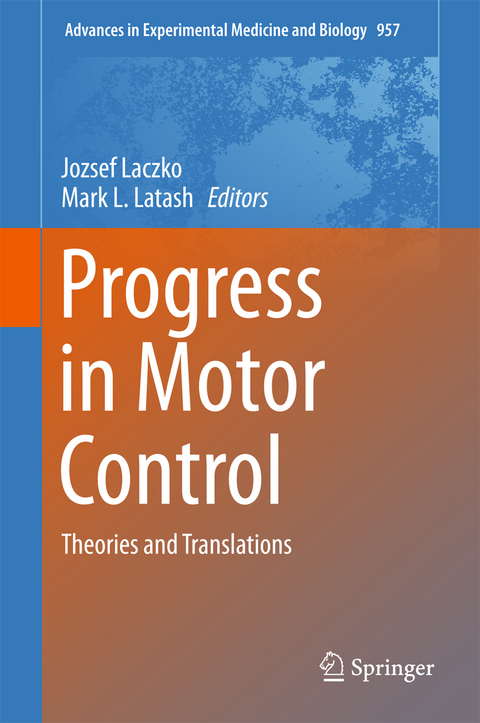
Progress in Motor Control
Springer International Publishing (Verlag)
978-3-319-47312-3 (ISBN)
Jozsef Laczko is head of Department of Information Technology and Biorobotics at University of Pecs in Hungary. He also holds positions in the Wigner Research Centre for Physics in Budapest and an adjunct assignment at the Northwestern University in Chicago. Dr. Laczko earned his Ph.D. in mathematics at the Eotvos Lorand University in Budapest, Hungary. He is experienced in computational approaches for motor control. He has published over 40 papers in refereed journals and proceedings, four book chapters and has presented over 50 professional talks. He was the chair of the “Progress in Motor Control X” conference of the Society for Motor Control. His chief research interest is on the area of biomechanics, and in the last decade, he became engaged in the control of Functional Electrical Stimulation driven limb movements for spinal cord injured individuals.Mark L. Latash is a Distinguished Professor of Kinesiology and Director of the Motor Control Laboratory at the Pennsylvania State University. He studied Physics, Physics of Living Systems, and Physiology in Moscow and Chicago. His research is focused on the control and coordination of human voluntary movements and movement disorders. He is the author of numerous books including, Control of Human Movement, The Neurophysiological Basis of Movement, Synergy, Fundamentals of Motor Control, and Biomechanics and Motor Control: Defining Central Concepts (with Vladimir Zatsiorsky). In addition, he edited nine books and published over 350 papers in refereed journals. Dr. Latash was the Founding Editor of the journal “Motor Control” and as President of the International Society of Motor Control. He continues to serve as Director of the annual Motor Control Summer School series. He is a recipient of the Bernstein Prize in motor control.
Modularity for motor control and motor learning.- Synergies in grasping.- Encoding temporal features of skilled movements--what, whether and how?.- Predictability and robustness in the manipulation of dynamically complex objects.- Fifty years of physics of living systems.- The relationship between postural and movement stability.- Principles of motor recovery after neurological injury based on a motor control theory.- What do TMS evoked motor potentials tell us about motor learning?.- Motor control of human spinal cord disconnected from the brain and under external movement.- Anticipation in object manipulation: Behavorial and Neural correlates.- Brain plasticity and the concept of metaplasticity in skilled musicians.- The coordination dynamics of observational learning: relative motion direction and relative phase as informational content linking action-perception to action-production.- Rethinking the study of volition for clinical use.- Motor lateralization provides a foundation forpredicting and treating non-paretic arm motor deficits in stroke.- Control of cycling limb movements: aspects for rehabilitation.- Impaired voluntary movement control and its rehabilitation in cerebral palsy.- Can motor recovery in stroke be improved by non-invasive brain stimulation?.- Organizing and reorganizing coordination patterns.- A computational index to describe slacking during robot-therapy.- Toward a proprioceptive neural interface that mimics natural cortical activity.
| Erscheinungsdatum | 20.01.2017 |
|---|---|
| Reihe/Serie | Advances in Experimental Medicine and Biology |
| Zusatzinfo | XX, 388 p. 94 illus., 48 illus. in color. |
| Verlagsort | Cham |
| Sprache | englisch |
| Maße | 155 x 235 mm |
| Themenwelt | Sachbuch/Ratgeber ► Sport |
| Medizin / Pharmazie ► Physiotherapie / Ergotherapie ► Orthopädie | |
| Medizin / Pharmazie ► Studium | |
| Naturwissenschaften ► Biologie ► Humanbiologie | |
| Technik ► Umwelttechnik / Biotechnologie | |
| Schlagworte | Biomedical and Life Sciences • biomedical engineering • Biomedical Engineering/Biotechnology • equilibrium-point hypothesis • Human-Machine Interface • Medical Research • Motor Cortex • Motor impairment • Motor Learning • motor recovery • neurophysiological • Neurosciences • Rehabilitation • spinal cord • Sports and Active outdoor recreation • Sport Science |
| ISBN-10 | 3-319-47312-3 / 3319473123 |
| ISBN-13 | 978-3-319-47312-3 / 9783319473123 |
| Zustand | Neuware |
| Haben Sie eine Frage zum Produkt? |
aus dem Bereich


